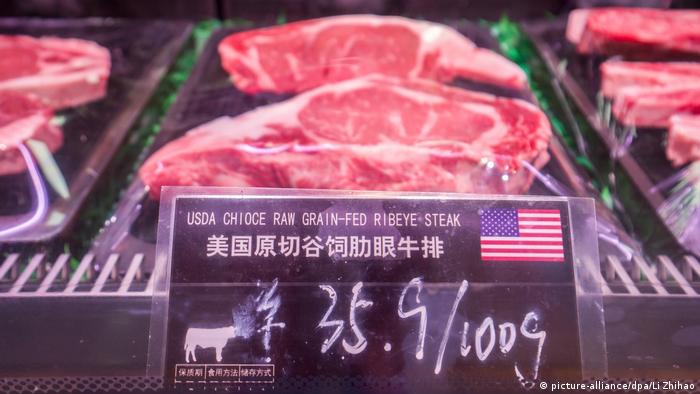
The new import tariffs imposed by Washington come into force, with immediate response from Beijing. The Chinese, however, are divided on the possible effects of these measures, and many prepare for the worst.
The United States imposed 25% tariffs on $ 16 billion worth of Chinese imports on Thursday (23/08), fueling the trade dispute between the two countries. The second round of punitive measures by Washington has caused Beijing to respond again in the same currency.
As long as punitive measures are maintained at the current level, the two largest economies on the globe will be able to absorb the impact of the extra costs. But what will happen if trade tensions get even worse? Does Beijing have enough strength to enter into an open trade war with its biggest partner in international trade?
The Chinese Commerce Department has announced that the country will overtax American imports of items ranging from crude oil to steel products and medical technology, measures that went into effect simultaneously with the US.
In June, however, the immediate reaction to the first round of rising US tariffs - which reached $ 34 billion in Chinese products - did not reach consensus in Beijing.
"The Chinese response came very quickly, they thought 'we will do the same, we will keep the parity', so to speak, but now it seems that many are wondering if this was indeed a smart move," says University of Cologne Thomas Jäger.
The Chinese people are concerned about how this trade dispute should unfold. "I think the US will win the trade war because they are more advanced than China. Despite the huge Chinese population, the advantage is on their side when the fight starts," says sports coach Lin Zaishi, 25, in Fuzhou, in the southeast coast of the country.
Finance manager Chen Jun, 40, looks at prospects on both sides. "I do not think either party is to blame because they are defending their national interests. [US President Donald] Trump's government takes into account their own interests."
A third interviewee in Fuzhou even criticized the Chinese stance. "The world can not live without the US They did a lot for world peace, sacrificed many of their soldiers and financed the UN with a lot of money."
"Even if China had the same resources as the US, our country will not assume the same responsibility, because the Chinese are selfish. I am Chinese, but I tell the truth," said the man, who declined to identify himself.
For months, trade conflict has been a dominant theme in China. Soon after the start of the war with Trump, the Chinese press highlighted the negative effects of its tariffs on the US economy. State-controlled media asserted that American businesses, consumers and workers would lose out. "Lift a stone just to knock it down on your own foot," says a Chinese proverb.
Chinese leaders warned that if the trade dispute worsens, the US economy will be the biggest loser. A few days ago, the pro-government tabloid Global Times went so far as to say that "the trade conflict will hit the middle class and the poorest families in a stronger way."
At any rate, while speculating about the possible effects, the Chinese seem to prepare for the worst. Despite rigid regulations, many Chinese people try to convert their goods into yuan into US dollars, euros or gold.
Some cases like that of a fund manager who tried to leave mainland China with several pounds of gold bars fuels paranoia in Chinese social networks.
Beijing decision makers have already triggered emergency brakes and instructed banks to allow withdrawals in foreign currency in amounts of up to $ 5,000 without the need for checks. In other cases, clients need to justify why they urgently need so many dollars. Some reports suggest that these measures were adopted stealthily.
"The commercial war has certainly frightened the population," says Huang Weiping of Renmin University in Beijing, who views US tariffs essentially as a form of psychological warfare. "The psychological effects override the real effects. The fear of the population is real, but the real impact on the economy is minimal," says the economics professor.
According to Huang, the volume of tariffs imposed by Trump is, to date, less than the annual volume of real estate business in a medium-sized city in China. "It's not a financial issue. Fear among the population is the biggest problem for the Chinese economy," he says.
Ren Zeping, one of China's best-known business analysts and chief economist at Evergrande's real estate research institute, believes, like many Chinese, that now is not the time for a major trade dispute with the Americans.
"Before the trade war, there was a tendency in China for exaggerated self-esteem and inflated self-confidence. The current conflict has done nothing but bring a return to reason," Ren says, adding that the country must recognize that there is still much to be done in terms of innovation, construction of high-level facilities, financial services, education, essential technologies and the military sector.
China's leaders must realize that the worsening trade dispute, as well as Europe's growing resistance to letting the Chinese take control of their companies, are warning signs that the country is being too ambitious, warns Jäger , of the University of Cologne.
The political scientist's comments focused on the "Made in China 2025" strategy, through which Beijing seeks to challenge the dominance of the US and Europe at the forefront of cutting-edge industry.
"Of course, all of this will have changed by the time of the centenary of the People's Republic of China in October 2049, when the country will not only be on an equal footing with the US, but will also dominate the essential technologies of the global economy" , said Jäger.
Nenhum comentário:
Postar um comentário